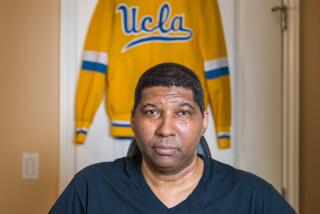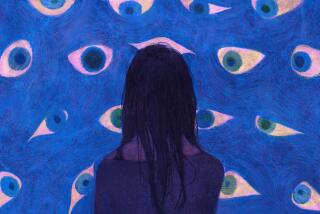IT’S ALL RELATIVE
I’d love to sit down and tell you my story, but I can’t get the words out.
You see, I’m not the same Walt Hazzard people remember. Forget about that ESPN Classic stuff. A lot has changed since 1964, when I was college basketball’s player of the year and helped lead UCLA to its first NCAA championship, or when I played in the NBA for 10 years. You might not even recognize me from my days as coach of the Bruins in the late 1980s.
I can say a couple of words at a time, but it’s a struggle. And I usually can’t find the right ones. I can’t get around as well as I used to, either. I use a wheelchair more than I walk, and my right hand is darn near useless.
My 58-year-old mind is still sharp. But, to tell you the truth, I can’t remember a thing about getting sick. You have to ask my family about that. My wife, Jaleesa, and youngest son, Rasheed, found me sitting on the edge of my bed one morning five years ago, staring into space. They thought I was joking at first. But they got really worried when I couldn’t answer them. I just shrugged my shoulders and looked confused.
Turns out, I had had a stroke. Doctors say a strep virus attacked a valve in my heart, causing a blood clot that did the damage. They say I came very close to dying, that I had to spend two weeks in intensive care. I don’t even remember police stopping traffic on San Vicente so a helicopter could land in the middle of the street and transfer me from a smaller hospital to UCLA Medical Center.
Two weeks later, I had open-heart surgery. My family moved into a temporary apartment near the hospital so they could be with me as much as possible. My friends would stop by my room a lot. Once, one of my old players, Brad Wright, came by my room and entertained everybody by doing magic tricks.
I don’t remember, of course. Jaleesa shows me pictures. She tells me how worried the family was, how thankful they are for every day since. She tells me how I used to have to wear a “gait belt” around my chest, so someone could catch me in case I tipped over. Imagine that, me, the guy who invented the Leaping Leaner, unable to stand upright.
Some things have gotten easier over time. I’ve learned to walk short distances and use my left hand to eat, write, even shoot free throws in the driveway of our house in Lafayette Square near the Crenshaw District. I work hard in rehab and my speech-therapy sessions. My family says I’m getting better by the day. It’s like I’ve always told them: You have to pay the cost if you want to be the boss. There’s no substitute for hard work.
I don’t ask for sympathy, and I don’t particularly like getting it. That’s what I love about Shaquille O’Neal. I played for the Lakers, remember, and worked in their front office. I still show up at practice a couple times a week. Shaq always makes a point of coming over to say hello. “Get up out of that wheelchair, Walt,” he’ll joke with me. “We’re going to the club. I’ll pull the Bentley around front.”
Shaq knows I don’t get out much anymore. I stay home and watch a lot of sports. I never miss an episode of “Walker, Texas Ranger,” or a rerun of “Fresh Prince of Bel Air.” My wife always teases me and says that’s the worst side effect of the stroke--an addiction to bad TV.
It’s not as if I get a lot of alone time, though. Our home is always full of people, starting with our four sons: Yakub, Jalal, Khalil and Rasheed. We’ve got five sons if you count Ansar, our friend from the Muslim mosque where we go to pray. He’s like an adopted son. Jaleesa calls this place the Kool Aid house.
There’s always someone around to drive me somewhere, push my wheelchair, or just hang out and pass the time. I’m not much of a conversationalist these days. Life can get pretty quiet.
One of the best parts of spending so much time at home is really getting to know my sons. Khalil is a record producer who has turned the guest house into a recording studio. Sometimes, I wander back and peek in on him. All my jazz albums are stored there. I have hundreds of them.
Yakub is a lawyer in Altadena. Jalal works for the Amateur Athletic Foundation.
Rasheed is the spit and image of me. He’s 24 and as stubborn as I am, maybe more, and he doesn’t smile much. He’s a tender-hearted kid, though, and he played basketball at George Washington. He wants to be a coach. He already has the wardrobe for it. He’s just my size, you see, so he has taken over my collection of suits. They’re lined up in his closet just like they were in mine--from dark to light--with all the shoes shined just so.
He was one of my ball boys when I coached at UCLA. The night games would run pretty late, sometimes past his bedtime. Once, when we were playing Stanford, Rasheed fell asleep on a bag of sweatpants at the end of the bench. He didn’t wake up when we carried him into the locker room, so we let him spend the second half in there. Someone took a picture of us carrying him off the court, and the picture was in the next day’s newspaper. Rasheed never heard the end of it.
UCLA was very good to me when I got sick. The school made sure I got the best doctors and the red-carpet treatment. In some ways, that was confusing for Rasheed. There’s a part of him that’s still angry at UCLA for firing me after I coached there for four seasons. He definitely has a love-hate relationship with the place.
I’ve gotten past that. I was as angry as anyone when I got fired, but I eventually let go of the anger. Doesn’t do anyone any good. Besides, UCLA is a huge part of my life, and has been since I came west after my childhood in Philadelphia. People say Philly guys never leave Philly. But I did. I played for John Wooden’s first championship team at UCLA, and I roomed with Arthur Ashe. How could I hate the place?
Arthur was with me when I met Jaleesa. She was a UCLA cheerleader, and I noticed her before she noticed me. One day, I was standing on campus talking to Arthur, and Jaleesa walked by.
“See that girl?” I said. “I’m going to marry her.”
And I did. Smartest move I ever made.
In a lot of ways, our family has grown even tighter since I got sick. Rasheed and I used to butt heads. Not anymore. Now, we’re as close as we’ve ever been. One of his favorite memories was the day before my stroke. I was going to Australia to coach an all-star team, and my back was hurting. So Rasheed was driving me around L.A., helping me get my passport. We had the sunroof open and the stereo turned up. We were singing along to my favorite CD: “Q’s Jook Joint” by Quincy Jones.
I don’t remember the day. Rasheed tells me he’ll never forget it.
My stroke has robbed me of a lot of memories. I can’t sit around and worry about it, though. It’s like I’ve always told my kids: If you take a tumble in life, pick yourself up, rub some dirt where it hurts, and keep on going.
Some days, you just need a little more dirt.
More to Read
Go beyond the scoreboard
Get the latest on L.A.'s teams in the daily Sports Report newsletter.
You may occasionally receive promotional content from the Los Angeles Times.







